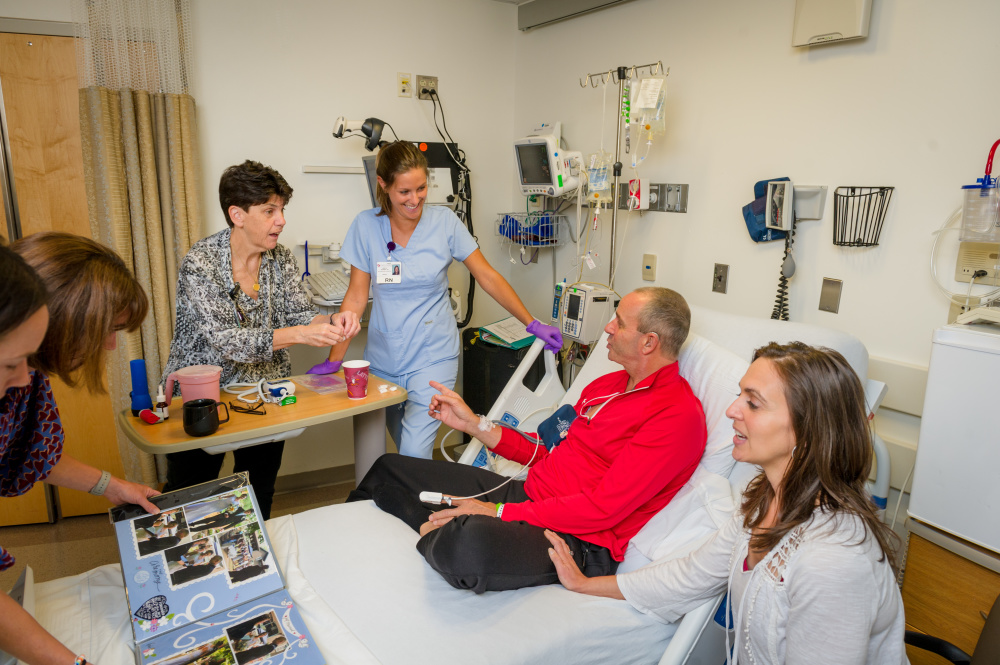CAR T-cell therapy is a cancer treatment in which a patient’s immune system T cells are genetically modified to mount a more effective attack on cancer.
As of May 2018, CAR T-cell therapy has been approved by the U.S. Food and Drug Administration as standard therapy for some adult patients with aggressive non-Hodgkin lymphoma that has relapsed after prior treatments, or has not responded to other therapies (refractory), and for patients age 25 and under with relapsed or refractory B-cell acute lymphoblastic leukemia.
CAR T-cell therapy is being tested in clinical trials for patients with certain types of leukemia, lymphoma, or multiple myeloma. Recently, trials of the therapy have opened for patients with some types of solid tumors.

There are strict criteria for which patients may be treated with CAR T-cell therapies, whether as part of a clinical trial or standard treatment.
One trial, for example, is open to adult patients with diffuse large B-cell lymphoma that has stabilized or worsened after chemotherapy. Another is open to patients with mantle cell lymphoma who have relapsed after chemotherapy or a stem cell transplant, or were not a candidate for transplant, and were also previously treated with the targeted drug ibrutinib.
Patients with multiple myeloma are eligible for CAR T-cell therapy trials if they have been treated with three prior lines of therapy – including a proteasome inhibitor and an immunomodulatory drug – and whose disease has either relapsed or is both relapsed and refractory (drug-resistant).
In the setting of a clinical trial, criteria like these allow investigators to study the safety and effectiveness of the therapy in distinct sets of patients. Such specificity enables investigators to draw scientifically valid conclusions about the therapy’s value and potential side effects in those patients. The results of a trial guide the FDA in deciding whether CAR T-cell therapy can be offered to such patients as standard therapy.
Although patient eligibility requirements vary from trial to trial, all trials limit enrollment to patients who are likely to be able to tolerate the sometimes severe side effects of CAR T-cell therapies. Criteria may include adequate heart, liver, and kidney function, as well as sufficient production of blood platelets needed for clotting. Patients need an adequate “performance status” score – which measures general well-being and ability to care for themselves. Some trials may not be open to patients who have had an autoimmune disease that has been treated in the recent past or who have had certain neurological disorders.
Learn More:
One requirement for participation in a CAR T-cell therapy trial is fairly unusual: Patients need to be healthy enough to get through the two to four weeks it takes to manufacture CAR T cells – during which T cells are collected from a patient’s blood, sent to lab for genetic modification, allowed to reproduce until they number in the millions, then given back to the patient. For lymphoma patients, that means going without therapy, including steroids, for the duration of the manufacturing process, says Caron Jacobson, MD, medical director of Dana-Farber’s Immune Effector Cell Therapy Program and leader of several clinical trials of CAR T-cell therapies in lymphoma.
Patients with leukemia who have been treated with chemotherapy may have low counts of T cells and other white blood cells, potentially leaving their T cell levels too low for collection. Leukemia patients also need to be healthy enough to receive “bridging” chemotherapy, if necessary, to hold their disease in check while the CAR T cells are being made, says Daniel DeAngelo, MD, PhD, director of Clinical and Translational Research for the Adult Leukemia Program at Dana-Farber, who has led trials of the therapy in leukemia.
Patients with myeloma may receive a cycle of anti-myeloma treatments during the waiting period based on their physician’s recommendation, says Jacob Laubach, MD, MPP, clinical director of the Jerome Lipper Multiple Myeloma Center at Dana-Farber. Treatment recommendations are made based on each individual patient’s condition.
Because of the complexity of some of the entry requirements of CAR T-cell therapy trials, it is recommended that patients talk with their physicians about the availability of clinical trials for their specific disease.
Learn more about CAR T-cell therapy from the Cellular Therapies Program at Dana-Farber.
